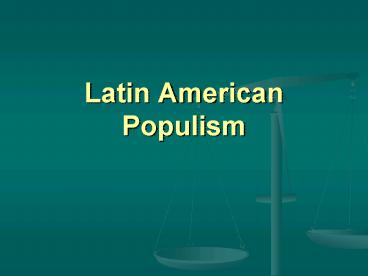Latin American Populism - PowerPoint PPT Presentation
1 / 14
Title:
Latin American Populism
Description:
Legalistic in his or her approach to change. Spoke in nationalist terms. Believed in middle road between ... Was frequently branded as 'fascist' by opponents ... – PowerPoint PPT presentation
Number of Views:245
Avg rating:3.0/5.0
Title: Latin American Populism
1
Latin American Populism
2
Americas Syllabus Location
- Section 13 Latin American politics in the first
half of the 20th Century - Evolution of nationalism, indigenism, and
populism - Role of military
- Leaders, single-party states and populism
Vargas, Peron - Nature and effectiveness of dissent
3
Characteristics of Populist
4
- Outsider to traditional political elites
- Legalistic in his or her approach to change
- Spoke in nationalist terms
- Believed in middle road between unbridled
capitalism and communism - Advocated a strongly interventionist role for the
state in the national economy - Branded elites as the oligarchy and condemned
them for their selfishness and lack of foresight - Condemned imperialism in moralistic terms
5
- Was frequently branded as fascist by opponents
- Was a charismatic figure of great personal
magnetism and superior oratorical skills - Enjoyed paternalistic relationships with their
followers - Stressed the immorality of the status quo
- Studied the oratory and ideology of European
dictators - Believed that massive social transformations
could be effected through existing structures
through peaceful reform
6
- Appealed to lower class and lower middle class
voters affected by uneven or cyclical development - Lacked a systemic approach to political economy,
viewing it as a function of the interaction
between good and evil social groups - A populists strength rested on his or her
strength of personality rather than party
organization
7
Early Populism in South America
- Two phases of populism
- First phase is called the reformist phase and
takes place before the Great Depression - Second phase began in the late 1930s Classic
Populism - By the 1960s a series of military coups had
brought an end to the populist era - A resurgence of populism is taking place in Latin
America
8
Reformist Populist
- Leaders generally addressed
- Voter rights and elections
- Nationalism
- Labor relations
- Built movements on broad agreement around these
ideas - Votes for early populist came from all social
classes - Their strategy was to reform society in order to
protect it from the radicals
9
Examples of Reformist Populists
- Jose Batlle y Ordonez - Uruguay
- Hipolito Yrigoyen - Argentina
- Arturo Alessandri - Chile
- Some foundation for their ideas grew out of
Spanish liberalism (Hispanismo) which drew from
ideas of German Karl Christian Fredrich Krause
(Krausismo)
10
Krausismo
- Alternative to positivism and Social Darwinism
- Uplifting less fortunate
- Education at all levels
- Womens rights
- Labor unions
- International law as basis for peace
- Valued ethical behavior and appreciation of
culture over material success
11
Classic Populism
- Political economy dominated the agenda
- Urbanization and industrialization lead to
increased populations in the cities - Working class voters now outnumbered rural voters
- Approached through labor unions and associations
- Populist leaders appealed to these voters by
offering larger share of national income and jobs - Programs were nationalistic, pledged to end
economic dependency
12
- Populist challenged the entrenched power
structures - Church
- Army
- Landed elite
- Bankers
- Foreign investors
- Traditional parties
- The question was how would these groups respond
13
- Early cooperation between populist and
establishment (benefited from each other) - First nonviolent mass movements in the regions
history - As long as populist leaders did not threaten
existing power holders they prospered and gave
Latin American politics a modern face - By the mid 1950s populist began to upset older
elites - Army, church, industrialists
14
Examples of Classic Populists
- Lazaro Cardenas - Mexico
- Getulio Vargas - Brazil
- Juan Peron - Argentina
- Haya de la Torre - Peru
- Jose Maria Velasco Ibarra - Ecuador
- Romulo Betancourt - Venezuela
- Victor Paz Estenssoro - Bolivia
- Jorge Eliecer Gaitan - Colombia
- Jose Pepe Figueres Ferrer - Costa Rica































